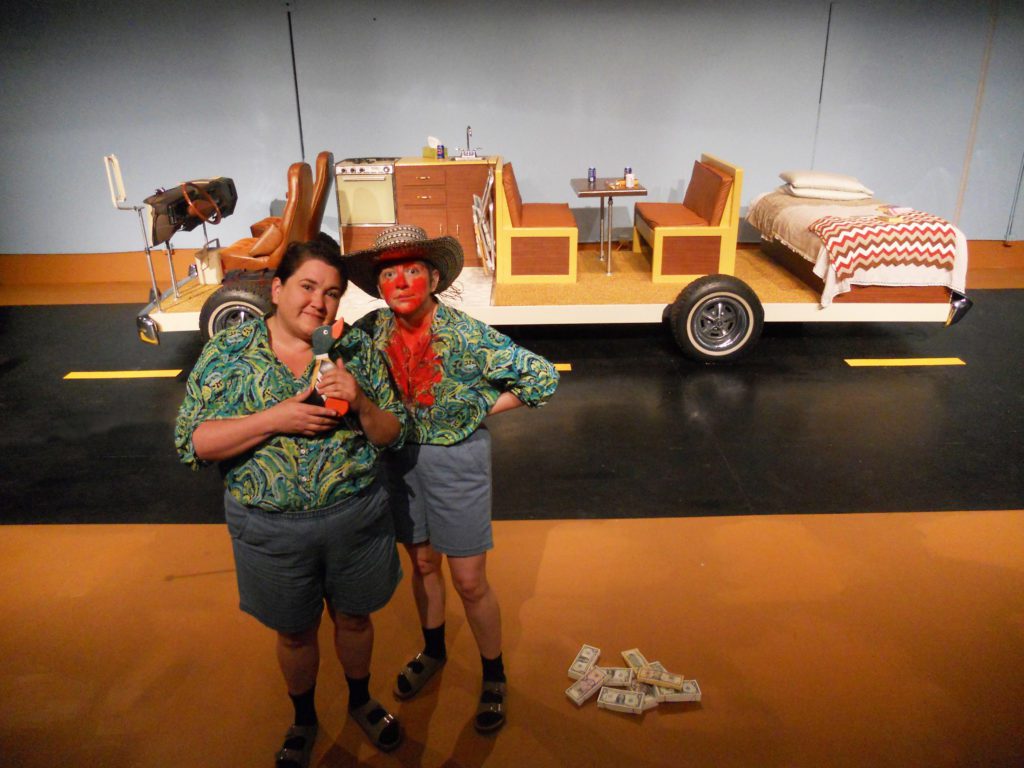Peggy Jo Tallas was an outwardly conventional, quiet-spoken Texas woman who, after a mildly adventurous youth, lived with her mother for many years. Starting at the age of forty, she also robbed banks – perhaps because she was bored, perhaps because she was seeking a fuller and more interesting life, perhaps because she just needed some cash. Although she never scored a huge amount of money, she was extremely competent at her job. Her robberies were accomplished swiftly, bloodlessly, and with a minimum of fuss. And she so successfully disguised herself as a man that for a long time, FBI agents – perhaps aided by the kind of masculine myopia that believes no woman could possibly accomplish anything as tough as a bank robbery – were looking for a culprit they dubbed Cowboy Bob.
It’s an intriguing story with several questions at its core: Who was Peggy Jo Tallas, and why did she do what she did? And, by extension, what do her activities say about the culture she lived in? In taking on these questions with Peggy Jo, Buntport Theater Company partnered for Peggy Jo and the Desolate Nothing with Boulder’s Square Product Theatre and its director, Emily K. Harrison.
Buntport has divided the role of Peggy Jo four ways. All three of the women play her – Harrison at the age of forty, and Hannah Duggan and Erin Rollman at sixty, when Tallas’s career came to an end; they play a handful of ancillary characters, too. Brian Colonna also plays Tallas at forty – or, rather, her alter-ego, Cowboy Bob. None of the portrayals is particularly specific, nor do the actors seem to represent different facets of Tallas’s personality so that when you take all of their efforts together it adds up to some kind of whole. Which means you leave with no more understanding of this woman than you had on first taking your seat. Throughout, Erik Edborg plays patient, baffled FBI agent Steve Powell.
Metaphor is good and repetition a time-honored theatrical device, but these things don’t substitute for action and character. The actors have seized on pieces of Peggy Jo’s biography that might explain something about her psyche or universalize her story. Phrases from Ferlinghetti recur – “slippery gibbets,” “carnivorous cocks,” “false windmills and demented roosters” – all because Tallas once visited San Francisco and gave Ferlinghetti’s work to a friend. Tallas also liked Butch Cassidy and the Sundance Kid, and the featured song from that movie, “Raindrops Keep Fallin’ on My Head,” plays again and again until its bouncy rhythms become vaguely threatening. But it doesn’t help anything that after a while you know exactly what you’ll hear if anyone on stage touches the radio knob.
There are several comments about narrative and myth-making: “All storytelling is selective, Steve” and “We’re creating a mythology based on bits and pieces.” But there is no myth about Peggy Jo Tallas to be debunked, filled out, simplified or complexified, because few people know enough about her to have a story in mind. What this blended company needed to do was create that story. Or – had the crew wanted to go further – create and then deconstruct it.
What’s odd is how understated Tallas’s robberies seem to have been, particularly in comparison with highly romanticized movies like Butch Cassidy or Bonnie and Clyde, which is also mentioned here. There’s no sex or romance, no great gouts of blood, no missing millions or decades-long disappearances to exotic lands – just a vague dream about a beach in Mexico. And, of course, that’s the point. That, and the ennui of Tallas’s long road journeys. The actors try valiantly to insert a sense of existential despair, but it doesn’t mitigate the show’s static feel. Peggy Jo isn’t boring, but it isn’t involving, either.
There are moments in which Buntport’s originality and eccentricity come through, though, and some performances that work, including Colonna playing it humorously straight as Cowboy Bob and Edborg’s low-key Agent Powell. Duggan’s very presence communicates a comic sense of existential worry mixed with slight annoyance, and one of the evening’s high points is her passionate assertion that since baby ducks imprint on the first moving creature they see, the pull-toy duck she takes everywhere “knows it’s human. It knows I’m its momma.”
This company is always worth watching. But by the end of Peggy Jo, you’re left with pretty much nothing. And not even a desolate nothing at that.
-Juliet Wittman, June 5, 2014, Westword
